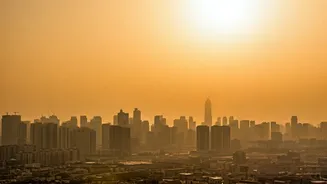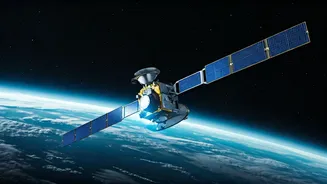Delhi's Smog Crisis
Recent reports indicate a significant decline in Delhi's air quality, pushing it into the 'very poor' category. The city has been enveloped in a dense
blanket of smog, leading to significant health concerns and reduced visibility. This situation raises serious alarms regarding the environmental conditions in the capital and underscores the urgent need for effective measures to combat air pollution. Various factors, including vehicular emissions, industrial activities, and seasonal influences, contribute to this escalating crisis.
Factors Behind Pollution
Multiple elements contribute to the deteriorating air quality in Delhi. Vehicle emissions, a constant source of pollutants, play a critical role, releasing harmful gases and particulate matter into the atmosphere. Additionally, industrial activities, particularly those involving burning fossil fuels, exacerbate the problem. Seasonal changes, such as the increase in stubble burning in neighboring states, also worsen air quality during specific periods. These factors collectively create a complex environmental challenge that demands a multi-pronged approach for mitigation and long-term sustainability.
Impact on Citizens
The 'very poor' air quality poses significant health risks to the residents of Delhi. Exposure to high levels of pollutants can trigger respiratory problems, cardiovascular ailments, and other health complications. Vulnerable groups, including children, the elderly, and individuals with pre-existing conditions, are particularly at risk. The decline in air quality also reduces visibility, affecting transportation and daily life. Public awareness and proactive measures are crucial to minimize the health consequences and improve the overall quality of life for the city's inhabitants.
Government Response
The government is expected to take measures to address the air quality issues. Potential actions may include stricter enforcement of emission standards for vehicles and industries, promotion of cleaner fuels, and measures to control and prevent agricultural stubble burning. Investments in public transportation and initiatives to encourage the use of electric vehicles are crucial long-term solutions. Implementation of effective pollution control strategies is important for improving air quality and protecting public health.
Possible Solutions
A comprehensive strategy is required to improve Delhi's air quality. This includes adopting stringent emission control measures for vehicles and industries, implementing and enforcing the rules. The transition to cleaner fuels, the expansion of public transportation networks, and the promotion of electric vehicles are crucial steps toward long-term sustainability. Encouraging sustainable practices, increasing public awareness through educational campaigns, and integrating environmental considerations into urban planning are all essential elements for a healthier environment.




















